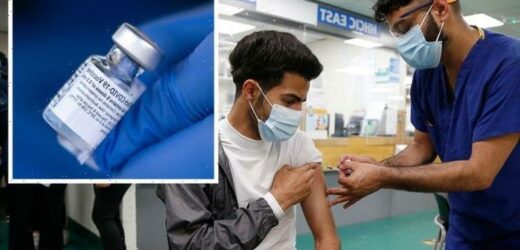GMB: Dr Amir talks about mild effects of booster vaccine
We use your sign-up to provide content in ways you’ve consented to and to improve our understanding of you. This may include adverts from us and 3rd parties based on our understanding. You can unsubscribe at any time. More info
It comes as concerns have been heightened over the new strain, first identified in South Africa. The UK yesterday recorded a further 88,376 cases of COVID-19, a record high said to have been achieved thanks to a spike in Omicron. But it also saw a one-day record high of 750,000 boosters given to Britons, following pleas from both Prime Minister Boris Johnson and Chief Medical Officer Chris Whitty.
And there’s even more reason to go and book your vaccine now as experts find it can mount an immune response in a matter of days – not weeks.
Gary McLean, a professor in molecular immunology at London Metropolitan University, said: “The immunity generated after a booster jab will rise much quicker than the first immune response.”
The effects can reportedly start to work in as little as two days.
That’s because crucial memory cells activated after the first dose will still be present in the body.


Prof McLean said they, therefore “do not require the two-week activation and instruction phase they initially go through”.
These memory cells – T and B – are responsible for hunting down infected cells and producing antibodies that stop the virus from gaining entry in the first place.
Their uninterrupted presence in the body means the immune system is already prepped to spring back into action.
Prof McLean added: “That can then translate into boosted antibody levels and other increases inactive T cells within days of the booster.
“It is likely that maximal immune activity is reached seven days after the booster.”

Professor Charles Bangham, an immunologist and co-director of the Institute of Infection at Imperial College London, agrees.
He said that a booster jab can see T cells and antibodies respond within “two to three days”.
Experts believe the boosters are 70 percent effective against the Omicron infection – and even higher at preventing hospitalisation and death.
But now the UK is in a race against the virus.
Doubling at a rate of every two days, Omicron has fuelled a sudden lift in national cases.
The UK Health Security Agency said it expects there to be more than one million infections a day by the end of the month.


It is vital now vital for Britons to get their third jab.
The number of coronavirus cases in the UK has increased by 105,595 or 31.4% in the last seven days, compared to the previous week, according to the government figures.
The number of daily deaths reported has decreased by 6% in the last seven days, compared to the previous week.
It’s worth remembering that it takes time for hospital admissions and deaths to show up in daily figures after cases start to rise.
And it’s only been a few weeks since the first Omicron cases were identified in the UK.
It is likely that we will continue to see records being broken.
Source: Read Full Article


